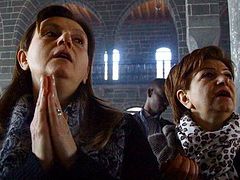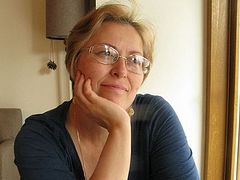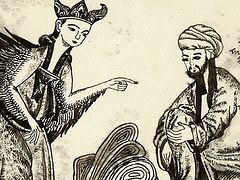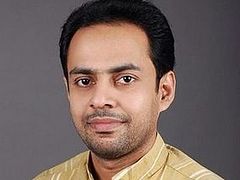Source: Christian Today
Despite the daily news of the persecution of Christians around the world by Islamist groups, there is another, lesser-known story of growing numbers of Muslims around the world who are turning to Christ as Lord.
Missionary David Garrison's book, A Wind in the House of Islam, charts this phenomenon, which he says demonstrates that "we are living in the midst of the greatest turning of Muslims to Christ in history".
The book is the result of two and a half years of research and involved travelling more than 250,000 miles to conduct interviews with more than 1,000 people around the Muslim world. In the study, a 'movement' of believers is defined as a group of more than 1,000 baptised believers or 100 new churches within a Muslim community. In total he found 69 movements that had started in the first 12 years of the 21st century, in comparison with virtually no voluntary movements of converts to Christianity in the first 12 centuries of Islam.
 David Garrison spent two and a half years interviewing Muslim converts to Christ about their faith.
David Garrison spent two and a half years interviewing Muslim converts to Christ about their faith. "What is exciting is not just how big the movements are...but how many of these movements there are now and that they're not limited to one corner of the world, but we're seeing them from West Africa to Indonesia, and virtually everywhere in between," he says.
Muslims who convert to Christianity can face the death penalty and many experience intense persecution, so converts are often underground, making it impossible to know exactly how many new believers there are, but estimates currently range between 2 and 7 million.
So why is this turning to Christ happening now? "God has brought several elements together uniquely in our time," he says. "Some of them are old elements – Muslim violence is not new, this is one of the least violent centuries in Muslim history – but what's different is today when Muslims experience this violence, they can see an alternative... they can switch on their Internet, they can turn on their television and hear an evangelist speaking Farsi or Kazakh or Uzbek."
It's also the combination of Bible translation alongside the potential for multimedia evangelism and the growth of international travel that appears to have facilitated this change. "It's a great day that God seems to be orchestrating for this to happen."
Among the converts he met were numerous senior religious leaders. On Christmas Day 2011 he met with 20 leaders from a fundamentalist Muslim people group; 19 had been baptised, 17 were imams (leaders of the mosque) and three of them were women.
When he asked them why they hadn't left their community and moved away to form a church, one of the women replied: "When God wanted to reach men, he became a man. If God had wanted to reach hyenas, he would have become a hyena. If we want to reach our own people, we've got to stay in our community to reach them."
"They were willing to pay the price, even if it meant death, in order to win as many of their family and friends to Christ as possible," he says.
The following day he met a sheikh who had led 400 other sheikhs to faith in Christ, 300 of whom had been baptised. "It's one thing for a sheikh to say 'Oh I love Jesus', but baptism says 'I recognise that he is the only way of salvation'."
UNEXPECTED CONVERSIONS
Some of the ways Muslims come to faith are unexpected. A common thread among some of the conversion stories was Muslims coming to faith in Christ through reading the Qur'an in their own language. Some had memorised the entire Qur'an in Arabic even they didn't understand the language
One man he met had been prompted to read a translation of the Qur'an which he said made him realise that he was lost and that he that he needed to know more about Jesus. He then read the New Testament and decided to follow Christ, and went on to see 33,000 people come to faith in Jesus by encouraging them also to read the Qur'an in their own language.
There are some other recurring stories, such as the large number of Muslims who have encountered Jesus in a dream or vision, but, he says: "Each story is different – one of the beautiful things is that this is not a cookie cutter approach. God seemed to be as personal with each conversion as he was in my life.
"It said to me that this is not a sociological phenomenon, this is a spiritual, personal encounter."
Even with these remarkable stories, the number of converts is only a tiny fraction of the 1.6 million Muslims in the world. But the point of the research is not just a numbers game; it's intended as an encouragement for Christians, and, perhaps more controversially, for Muslims who might be feeling disenchanted with Islam.
Garrison tells the story of a friend in Africa who was reading the book on an aeroplane, and a Muslim man was looking at it over his shoulder and asked him about it. The man said: "Three months ago I decided I need to change my religion," but he hadn't done anything about it yet. He read a chapter of the book, and by the time the plane landed, he had given his life to Christ.
SIGNIFICANT CHALLENGES
Beyond the encouragement of hearing that Muslims are finding faith in Jesus, there are some significant challenges for the Church. First, we can be inspired by the attitude of those who are living with the daily threat of persecution, but nonetheless continue to meet and worship faithfully in small groups.
One group of converts in Central Asia said they tell each other: "If you're persecuted just thank God that you haven't been beaten, if you've been beaten, thank God you haven't been thrown in prison, if you're in prison, thank God you haven't been killed, and if you've been killed, thank God that you're with Jesus in heaven."
For much of the last 13 centuries, Christians in the West have been "failing" to bring Muslims to Christ and instead losing many Christians to Islam. Although "the tide is turning", he points out that it's happening "over there". Another challenge for the Western Church, therefore, is to be a part of this change, both locally and globally – through reaching out to Muslim neighbours, and being prepared to take the gospel to unreached communities abroad.
In order for this to happen, he says Christians need to stop fearing Muslims. "This is not the day to fear, fight, hate or kill Muslims... This is their day of salvation. God loves them – if you want to be on God's side in this day, be a part of what God's doing."
While fear may be a natural response to the stream of stories about the violence of groups such as Islamic State, he says "that is not what our birth right is as followers of Christ. Christ is all about taking what man intends for evil and turning it to good. And that's not a natural response... prayer is the only way we can get to that."
He gives the example of a man at his church whose son was killed in Afghanistan and ever since had struggled with anger and hatred. After a sermon on the subject of loving Muslims, he came forward for prayer and said: "I realise can't follow Jesus and have anger and hatred... I'm going to leave it here on this altar."
"That's the supernatural, Jesus response," Garrison says.
David Garrison's book A Wind in the House of Islam (WIGTake Resources) is out now. He is currently touring the UK with the Hope for Muslims initiative which seeks to encourage Christians to pray and reach out to Muslims. This weekend he will be speaking at GOfest in Buckinghamshire.








Hmm...I think you meant to say 1.6 *BILLION* Muslims.